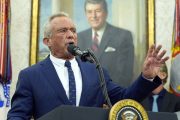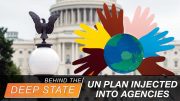
President Joe Biden said U.S. health authorities were looking at administering COVID booster shots five months after people finish their primary immunizations, shortening the previously announced timetable for a third shot by three months.
Biden, who was speaking with Israeli Prime Minister Naftali Bennett on Friday, said the country may follow Israel’s “advice” to start offering boosters earlier.
Biden said:
We’re going to start mid-September, but we’re considering the advice you’ve given that we should start earlier. And the question raised is: Should it be shorter than eight months? Should it be as little as five months? And that’s being discussed.
The president added the rollout would be pending the Food and Drug Administration (FDA) approving the use of boosters.
Bloomberg reports that the Biden COVID response team, when considering the COVID booster, relied heavily on data from Israel, which, being one of the most vaccinated countries in the world, has experienced a sharp rise in infections among both vaccinated and unvaccinated people and turned to boosters to tame the spread.
In late June, Israel started administering a COVID booster to people over 60. Speaking to the nation at that time, Bennett said that “Reality proves the vaccines are safe. Reality also proves the vaccine protects from severe morbidity and death. And like the flu vaccine that needs to be renewed from time to time, it is the same in this case.”
Throughout August, the booster program has gradually been rolled out to more of the population, and third shots have become available to everyone over the age of 30 since last Tuesday. On Sunday, Israel expanded the program to include anyone over the age of 12.
When making the decision in favor of boosters, Israelis stated that their exclusively used Pfizer vaccine loses its potency in protecting against catching the virus over time. Local media reported the figures, based on cases from June 20 to July 17, showing that those who were fully vaccinated had only a 40.5-percent chance of avoiding symptomatic COVID, but an 88 percent chance of avoiding hospitalization. It was also observed the decline in protection is rather rapid: Among those who were inoculated in January, there was only a 16-percent effectiveness against being infected, compared to 44 percent for those vaccinated in February, 67 percent for those who got jabbed in March, and 75 percent in April.
Similar findings were reported by Pfizer itself, which found the vaccine was most protective between one week and two months after people received the second dose. However, every two months, the effectiveness of the vaccine declines by about six percent, which Pfizer CEO Albert Bourla said was “not uncommon,” while adding that “in terms of protection against severe disease, Pfizer’s vaccine did not waver, staying at around 97 percent.” The top pharmaceutical executive suggested at the time the third vaccine dose will “likely” be needed within 12 months from being jabbed. Echoing the Center for Disease Control and Prevention (CDC) statement on further mutations of the coronavirus that would escape current vaccines, Bourla remarked last week that his company expects a vaccine-resistant COVID variant will likely emerge. He reassured the people that Pfizer already has a system in place to release a “variant-specific” jab within 95 days.
Pfizer’s competitors, Moderna and Johnson & Johnson, indicated, per Bloomberg, that they have “been in regular dialog with the FDA on this topic,” and that the situation is rapidly developing.
While the boosters are praised as the best protection against the virus, Israeli top health officials admit there is no data yet to predict the duration of the boosters’ efficacy.
In mid-August, the CDC started recommending immunocompromised people, who make up as many as 44 percent of hospitalized breakthrough COVID infections in the United States, get their third dose of vaccine. While the CDC does not recommend additional doses or boosters for any other population at this time, the Department of Health and Human Services (HHS) has announced a plan to begin offering boosters to the general population beginning the week of September 20 and starting eight months after an individual’s second dose. The same was confirmed by the White House Press Secretary Jen Psaki on Friday.
Dr. Anthony Fauci said Sunday that the United States was still planning to administer booster shots of the COVID vaccine eight months after the last dose, but left room for readjustments: “We’re still planning on eight months,” Fauci said, while adding, “That’s the plan that we have, but we are open to data as they come in” and that the authorities will be “flexible” about it.
Fauci also said he agreed that it was likely the Pfizer and Moderna mRNA vaccines “always” required a third dose, while the Johnson & Johnson vaccine required two, and if the authorities were not in such a rush to “save lives,” that would have been recommended from the beginning of the vaccine rollout. Seemingly flip-flopping on yet another issue, Fauci said, “I don’t think there was anything errant or wrong in the way we started it with two doses, but at least now we’re being very open and flexible that we may need that third dose.”
The CDC’s Advisory Committee on Immunization Practices is meeting Monday to consider COVID booster shots for all eligible Americans.





